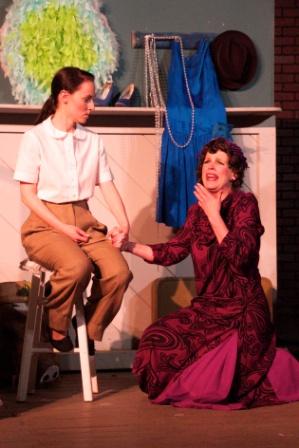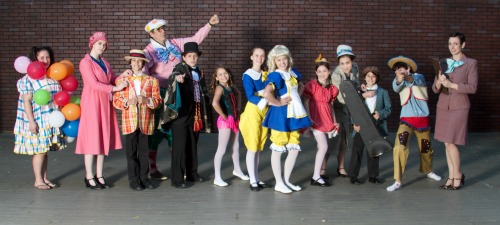Gypsy
Read the News-Times review
Read the Newtown Bee review
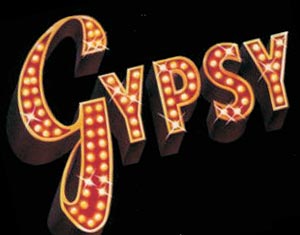
Performances: June 16, 17, 18, 19, 24, 25, 26
July 1 and 2
Music by Jule Styne
Lyrics by Stephen Sondheim
Book by Arthur Laurents
Based on Gypsy: A Memoir by Gypsy Rose Lee
Directed by Donald Birely
Musical Direction by Dan Koch
Choreographed by Matt Farina
Background
Hailed as the greatest American musical by numerous critics
and writers including New York Times critics Ben Brantley and Frank
Rich, Gypsy (subtitled “A Musical Fable”) is loosely based on the 1957
memoirs of burlesque star Gypsy Rose Lee. With music by Jule
Styne, lyrics by Stephen Sondheim and a book by Arthur Laurents, Gypsy
focuses on Lee’s childhood onstage with her sister, actress June Havoc,
and their larger-than-life mother, Rose. A fiercely determined woman,
Rose single-mindedly carves out a life for her girls on the vaudeville
circuit during the 1920s and 30s regardless of the cost or her
children’s interests. In the years since the show first opened,
the character of “Mama Rose” has become synonymous with the image of the
ultimate show business mother.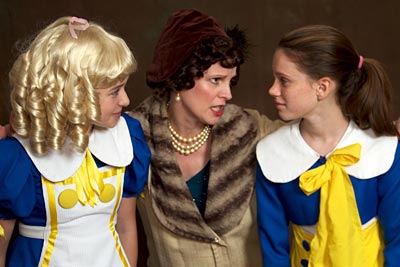
The original Broadway
production opened in 1959 and starred Ethel Merman, Jack Klugman and
Sandra Church. Directed and choreographed by Jerome Robbins, the
production won 8 Tony Awards and ran for over 700 performances.
Subsequent award-winning revivals starred Angela Lansbury (1974), Tyne
Daly (1989), Bernadette Peters (2003) and Patti LuPone (2008).
Rosalind Russell, Karl
Malden, and Natalie Wood starred in the 1962 Warner Bros. film
adaptation of the musical. Russell won the Golden Globe Award for Best
Actress - Motion Picture Musical or Comedy for her portrayal of Rose.
Gypsy was also
adapted as 1993 television movie with Bette Midler playing Rose. Cynthia
Gibb portrayed Louise and Jennifer Beck portrayed Dainty June. Bette
Midler won the Golden Globe Award for Best Performance by an Actress in a
Mini-Series or Motion Picture Made for TV; Michael Rafter won the Emmy
Award for Outstanding Individual Achievement in Music Direction.
Synopsis
Act I
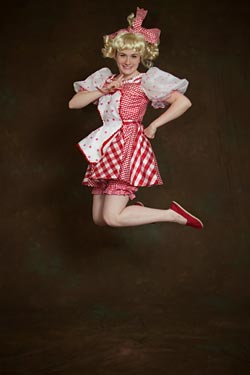 Rose
and her two daughters, Baby June and Louise, play the vaudeville
circuit around the United States around the early 1920s. Rose, the
archetype of a stage mother, is aggressive and domineering, pushing her
children to perform. While June is an extroverted, talented child star,
the older girl, Louise, is shy. The kiddie act has one song, "Let Me
Entertain You", that they sing over and over again, with June always as
the center-piece and Louise often as one of the "boys". Rose has big
dreams for the girls but encounters setbacks, as she tells her father
("Some People"). When Rose meets a former agent, Herbie, she persuades
him to become their manager using her seductive and feminine wiles
("Small World"). The girls grow up, and June, now billed as Dainty June,
is offered a shot at a Performing Arts school after an audition.
However, Rose turns this down immediately, refusing to break up the act.
Louise and June fantasize what life would be like if Rose were married
and finished with show business ("If Mama was Married"). A few months
later, still on the road from show to show, Tulsa, one of the boys from
the act, confides in Louise that he has been working on his own act
("All I Need Is The Girl"), Louise fantasizes that she and he could do
the act together. Shortly after, before leaving for another city, June
is missing. Louise runs in with a note she found. June wrote it,
explaining she has grown sick of her mother and has eloped with Tulsa,
and they will do the new act. Rose is hurt, but then optimistically vows
that she will make Louise a star, proclaiming that "Everything's Coming
up Roses."
Rose
and her two daughters, Baby June and Louise, play the vaudeville
circuit around the United States around the early 1920s. Rose, the
archetype of a stage mother, is aggressive and domineering, pushing her
children to perform. While June is an extroverted, talented child star,
the older girl, Louise, is shy. The kiddie act has one song, "Let Me
Entertain You", that they sing over and over again, with June always as
the center-piece and Louise often as one of the "boys". Rose has big
dreams for the girls but encounters setbacks, as she tells her father
("Some People"). When Rose meets a former agent, Herbie, she persuades
him to become their manager using her seductive and feminine wiles
("Small World"). The girls grow up, and June, now billed as Dainty June,
is offered a shot at a Performing Arts school after an audition.
However, Rose turns this down immediately, refusing to break up the act.
Louise and June fantasize what life would be like if Rose were married
and finished with show business ("If Mama was Married"). A few months
later, still on the road from show to show, Tulsa, one of the boys from
the act, confides in Louise that he has been working on his own act
("All I Need Is The Girl"), Louise fantasizes that she and he could do
the act together. Shortly after, before leaving for another city, June
is missing. Louise runs in with a note she found. June wrote it,
explaining she has grown sick of her mother and has eloped with Tulsa,
and they will do the new act. Rose is hurt, but then optimistically vows
that she will make Louise a star, proclaiming that "Everything's Coming
up Roses."
Act II
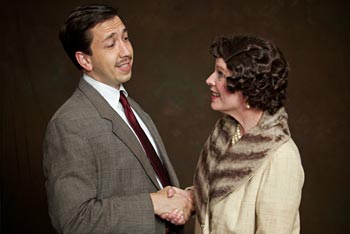 Louise
is now a young woman, and Rose has built a pale imitation of the Dainty
June act for her. Using all girls, instead of boys, Rose and Herbie try
valiantly to sell "Madame Rose's Toreadorables" to a fading vaudeville
industry. However, they are still together ("Together, Wherever We Go").
With no vaudeville venues left, Louise and her second-rate act wind up
accidentally booked at a burlesque house in Wichita, Kansas, as a means
to deter police raids. Rose is anguished, as she sees what a booking in
burlesque means to her dreams of success, but Louise persuades her that
two weeks' pay for the new act is better than unemployment. As they are
introduced to Louise, three of the strippers on the bill advise her on
what it takes to be a successful stripper, a "gimmick," something that
"makes your strip special" ("You Gotta Get a Gimmick"). Backstage, Rose
proposes to Herbie. He asks her to break up the act and let Louise have a
normal life, and she reluctantly accepts, agreeing they will marry the
day after their show closes. On the last day of the booking, the star
stripper in the burlesque show is arrested for solicitation. Desperate,
Rose cannot resist the urge to give Louise another nudge toward stardom,
and she volunteers Louise to do the strip tease as a last-minute
replacement. Disgusted at Rose's blind ambition for her daughter, Herbie
walks out on Rose forever ("Small World Reprise"). Although reluctant,
Louise wants to please her mother and she goes on, assured by Rose that
she needn't actually strip, but simply walk elegantly and tease them by
dropping a single shoulder strap. Shy and hesitant, she sings a
titillating version of "Let Me Entertain You," the song that their
kiddie act had used. She removes only her glove. The audience goes wild,
and this becomes Louise's "gimmick."
Louise
is now a young woman, and Rose has built a pale imitation of the Dainty
June act for her. Using all girls, instead of boys, Rose and Herbie try
valiantly to sell "Madame Rose's Toreadorables" to a fading vaudeville
industry. However, they are still together ("Together, Wherever We Go").
With no vaudeville venues left, Louise and her second-rate act wind up
accidentally booked at a burlesque house in Wichita, Kansas, as a means
to deter police raids. Rose is anguished, as she sees what a booking in
burlesque means to her dreams of success, but Louise persuades her that
two weeks' pay for the new act is better than unemployment. As they are
introduced to Louise, three of the strippers on the bill advise her on
what it takes to be a successful stripper, a "gimmick," something that
"makes your strip special" ("You Gotta Get a Gimmick"). Backstage, Rose
proposes to Herbie. He asks her to break up the act and let Louise have a
normal life, and she reluctantly accepts, agreeing they will marry the
day after their show closes. On the last day of the booking, the star
stripper in the burlesque show is arrested for solicitation. Desperate,
Rose cannot resist the urge to give Louise another nudge toward stardom,
and she volunteers Louise to do the strip tease as a last-minute
replacement. Disgusted at Rose's blind ambition for her daughter, Herbie
walks out on Rose forever ("Small World Reprise"). Although reluctant,
Louise wants to please her mother and she goes on, assured by Rose that
she needn't actually strip, but simply walk elegantly and tease them by
dropping a single shoulder strap. Shy and hesitant, she sings a
titillating version of "Let Me Entertain You," the song that their
kiddie act had used. She removes only her glove. The audience goes wild,
and this becomes Louise's "gimmick."
In the months that follow she becomes secure, always
following her mother's advice to "Make 'em beg for more, and then don't
give it to them!" This is demonstrated in a montage in which the song
becomes brasher and brassier, and more and more articles of clothing
come off. Ultimately, Louise becomes a major burlesque star and does not
need her mother any longer. 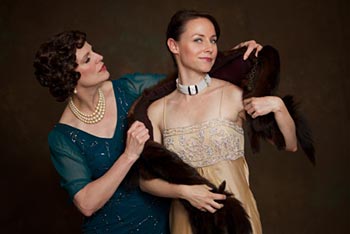 After a bitter argument between Rose and Louise, who has
become the sophisticated "Gypsy Rose Lee," Rose realizes Herbie and
June are both gone, and now Louise is lost to her as well. Rose, feeling
sad, useless and bitter asks "Why did I do it? What did it get me?"
("Rose's Turn"). It is during this number that all of Rose's unrequited
dreams of her own stardom and her personal demons surface. She
fantasizes about her own lit-up runway and cheering audience, but
finally admits "I did it for me." After her admission to Louise, Mother
and daughter tentatively step toward reconciliation in the end.In the 1974 and 2008 Broadway revivals, although the
final dialogue scene remains, there is not a happy ending, but rather a
bleak, sad one as all hopes of reconciliation for Rose and Louise fall
flat when Louise walks away, laughing sarcastically at Rose's new
"dream." The audience is then left with a Rose whose dream of her own
lit up marquee slowly fades away to her craziness within taking over.
After a bitter argument between Rose and Louise, who has
become the sophisticated "Gypsy Rose Lee," Rose realizes Herbie and
June are both gone, and now Louise is lost to her as well. Rose, feeling
sad, useless and bitter asks "Why did I do it? What did it get me?"
("Rose's Turn"). It is during this number that all of Rose's unrequited
dreams of her own stardom and her personal demons surface. She
fantasizes about her own lit-up runway and cheering audience, but
finally admits "I did it for me." After her admission to Louise, Mother
and daughter tentatively step toward reconciliation in the end.In the 1974 and 2008 Broadway revivals, although the
final dialogue scene remains, there is not a happy ending, but rather a
bleak, sad one as all hopes of reconciliation for Rose and Louise fall
flat when Louise walks away, laughing sarcastically at Rose's new
"dream." The audience is then left with a Rose whose dream of her own
lit up marquee slowly fades away to her craziness within taking over.
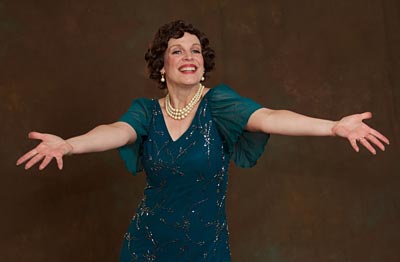
Songs
Act I
“Overture” – Orchestra
“Let Me Entertain You” – Baby June and Baby Louise
“Some People” – Rose
“Small World” – Rose and Herbie
“Baby June and Her Newsboys” – Baby June and Newsboys
“Mr. Goldstone, I Love You”† – Rose, Herbie, Ensemble
“Little Lamb” – Louise
“You'll Never Get Away From Me” – Rose and Herbie
“Dainty June and Her Farmboys” – June and Farmboys
“If Momma Was Married” – June and Louise
“All I Need is the Girl” – Tulsa and Louise
“Everything's Coming up Roses” – Rose 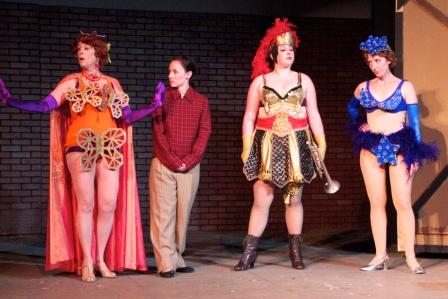
Act II
"Madame Rose's Toreadorables” – Louise, Rose and the Hollywood Blondes
“Together Wherever We Go” – Rose, Herbie, and Louise
“You Gotta Get a Gimmick” – Mazeppa, Electra, and Tessie Tura
“Let Me Entertain You”– Louise
“Rose's Turn” – Rose
CAST
Rose - Martha Lerman
Louise - Megan Corcoran
June - Rose Bisogno
Herbie - Damian Long
Tulsa - Billy Hicks
Baby June - Elle Sauli, Kimberly Wipfler (alternate in role)
Young Louise - Sarah Baker, Lindsay Cronin (alternate in role)
Newsboys - Gareth Ayre, Nicholas Chamberlin, Tyler Miller, Elliot Siegel
Farmboys - Bobby Eddy, James Hussey,Keenan Martin, Sammy Panzarino
Hollywood Blondes - Alexandra Aug, Christie Colucci, Brooke Morris
Tessie Tura - Jody Bayer
Mazeppa - Lauryn Linley
Electra - Jessica Smith
Uncle Jocko - Peter Lerman
Georgie - Jessica Smith
Uncle Jocko's auditionee - Julia Lerman
Pop - Mike Lozier
Mrs. Cratchitt - Dolly Conner
Cigar - Bill Lamoureux
Pastey - Keenan Martin
Mr. Goldstone - Mike Lozier
Weber - Bill Lamoureux
